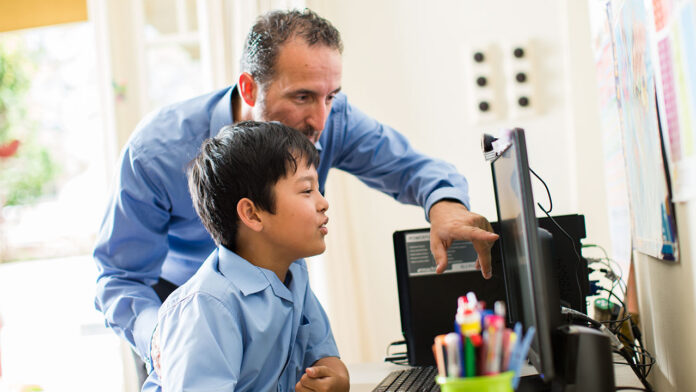
It’s important to teach your kids about internet safety since there are predators lurking at every corner.
The SafetyDetectives report that the internet has become a vital tool in society, and you can even say we cannot function properly without it. Everything goes through the World Wide Web and we can do thousands of things though it.
We can pay for goods, chat with our friends, watch videos, seek jobs, learn, and many more. This means that sooner or later your kids will also use it.
But for all the good that the internet has done, there are equally evil and harmful things. People can disguise themselves as others for the prospect of meeting them, post harmful things, and many more.
This is why it’s important to teach your kids about internet safety. This article is a 2024 guide that will teach you how to do just that. Don’t go anywhere as this article will be of great use.
Without wasting too much time, let’s begin.
1. Understand the Potential Risks

Children are fragile, young, and they tend to be very curious. The internet is sort of a place where anyone can post anything. That’s why it isn’t an unusual sight to see graphic content that isn’t suited for younger viewership.
But not only that, there are websites out there that promote some truly vile videos that would disturb you let alone your children.
But how would this affect your children? How would something so insignificant (given the context) such as school bullying affect your children?
The answer is simple. By watching videos of bullying, they might get upset about it, they might find it funny and most frighteningly, they might try it on their friends at school. They might think it’s cool but the opposite couldn’t be truer.
Engaging in the negative they see on the internet will put them on a downward spiral that might be hard to escape or overcome.
These, among many other and potentially worse, are the risks that our children are exposed to on a daily bases while browsing the World Wide Web.
2. Tips To Minimize Risk

When it comes to protecting your children from the negativity surrounding the World Wide Web, the only way to do it is by minimizing the risks.
Teaching them about it is the smart way to do it, but this isn’t always the option especially when they’re younger and they cannot understand it.
Certain apps and websites allow you to minimize these risks by implementing safety features that protect them from the negativity. These features come in the form of monitoring the apps your children are using, blocking websites, and tons of others.
From a younger age, implementing these features is a great way to protect your kids from all kinds of vile content on the World Wide Web.
But that’s not all you can do to minimize risk. Other helpful ways include talking it out with your kid, and these are the things you could say to them:
- Ask them to explain to you why they like the social media platforms they use, and ask them how and why they engage with their friends on it.
- Explain to them that social media platforms have security features that lock their profiles so others cannot see the content they post. This will significantly protect them from all kinds of eyes.
- Check their phones to see if the apps they use are putting the geo-location on. This isn’t something that every app would do, and it could be a sign of risk.
- Explain to them that they musk as for consent before posting any pictures of their friends and that their friends should do the same.
By talking about things with your children you are explaining to them your concerns and hopefully, they would see it as well. You shouldn’t be checking who your kids talk to and who they communicate with, but you should explain to them not to trust anyone on the internet.
You can go over at TechFiddle and find similar articles such as this one that will teach you about various tips surrounding the technology we use every day.
3. Keep Talking and Stay Involved in Real-Person
We are living in a digital age where our smartphones are considered an extension of our bodies. This was something that Elon Musk said a few weeks ago on the Joe Rogan podcast, and we couldn’t agree more with it.
Our smartphones play a huge role in our lives. Can you remember the last time you went out without one? The smartphone is inherently connected to the internet. Every app you use, well, the majority at least, requires internet access.
You have social media apps, YouTube, and tons of others that we use whenever we ride the train to work, we’re on our breaks, in our bathrooms, everywhere.
And this also includes our children. New moms and dads cannot stop their children from using the internet. Nowadays, it seems that the best way to keep your kids quiet is to give them your phones and let them watch videos.
A parent shouldn’t do this. A parent should talk with their children, communicate, be there in real-person and not just give them a phone just to keep them quiet.
Talk and communicate with your kids in real person whenever you can. If you distance yourself from them how would you expect them to come to you with a problem?
The most important thing overall is to talk about how the internet can harm them, how people can disguise as others, and that they should be careful whenever using it.
4. Do’s and Don’ts For Involving in Your Kid’s Online Activities

It is 100% in your right to be involved in your kid’s online activity. However, there are limits and you should respect them as otherwise, you’ll end up with other issues.
Let’s breeze past a few of those:
- Do tell your kids that they must listen to you regarding the use of the internet.
- Don’t ignore potential red flags, regardless of how they might present themselves
- Do tell them that they should rarely post pictures of themselves, especially if they’re younger.
- Don’t take away internet access if they’ve made a simple mistake on it.
- Explicitly DO tell them that they must NEVER meet anyone they don’t know on the internet.











